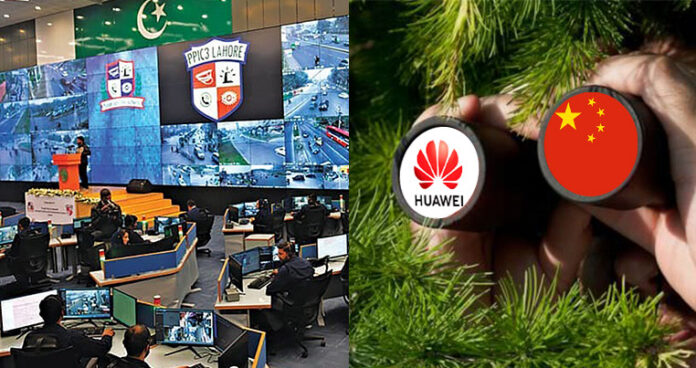American company Business Efficiency Solutions (BES) has filed a case against China’s Huawei for stealing their trade secrets to spy on Pakistan. According to the reports, BES and Huawei agreed to work together on a project for the Pakistani government in 2016 to install new technology for Punjab Police Integrated Command, Control, and Communication Center (PPIC3). This project was a part of the Punjab Safe City Authority (PSCA) initiative for overhauling the systems available to local police and law enforcement. The case of Huawei spying on Pakistan after stealing trade secrets from a US company is filed as No. 8:21-cv-01330 in California District Court. The complaint said that Huawei misused BES’s Data Exchange System (DES) to compromise Safe City and obtain data crucial to Pakistan’s national security.
Is Huawei Spying on Pakistani Citizens?
The common people are most likely to face the ultimate cost of Huawei spying in Pakistan. According to reports, Pakistani authorities sent requests for proposals (RFP) to several tech companies including Huawei, Nokia, and Motorola. It awarded the project to Huawei for reportedly 150 million USD. Huawei partnered with BES to provide eight software systems to Pakistan, which were described as:
Data Exchange System (DES): To store information related to national ID cards, telecom services, excise and customs, land, tax, passport, immigration records, and more.
Building Management System (BMS): To manage building security, access, and other environmental systems.
Learning Management Systems (LMS): To train and support the workforce
Resource Management System (RMS): To manage police resources including weapons, vehicles, etc.
Digital Media Forensics Center (DMFC): To manage captured images and videos from police networks.
Unmanned Aerial Vehicles (UAV): Industrial-level drones to conduct real-time surveillance.
Media Monitoring Center (MMC): To manage the internet, social media, broadcast, and print media.
Field Assets: Mobile Emergency Command and Control Vehicles, hidden cameras, laptops, cell phones, and tablets,
These systems reportedly included “valuable trade secrets” that were the core of BES’s business. The complaint said that Huawei bypassed BES and got a low-level design of these systems from the sources that BES told Huawei about. It secretly started to procure bits and pieces of BES’s systems without its knowledge. Then Huawei allegedly started to establish a “backdoor” using one of these systems i.e., DES. The complaint used the term backdoor to describe how Huawei created a path for the public’s private data to travel from Pakistan to China.
What Is this Backdoor in the Safe City?
There was also a duplicate of the same DES system that Huawei and BES created for the Safe City project. Reportedly it was for testing purposes and its servers were based in a Huawei facility in China. Huawei claimed that it got approval from the Pakistani government to store sensitive information in China but provided no such documentation.
The complaint said that Huawei threatened BES to install that duplicate system in China otherwise it would block all payments to BES. The American company claimed that since Huawei allegedly got testing approval from Pakistan, they installed the duplicate system. Being a duplicate also meant that it had full access to Pakistan’s Safe City project. However, BES allegedly terminated Huawei’s authorization to use the China-based DES after Huawei discontinued BES access to testing laboratories.
BES claimed that Huawei did not pay them and also did not return the confidential software designing tools liked it agreed. It led the American company to finally speak out about Huawei spying in Pakistan. It also cited a case from 2019 in which Punjab Police asked Huawei to remove Wi-Fi cards from CCTV cameras in Pakistan. These Wi-Fi cards were set to provide remote diagnostic information from the camera recordings. BES alleged that these cards were also a hidden backdoor for operators in China to secretly monitor Pakistani people.
Is It Another Episode of US-China Conflict?
Such allegations against the Chinese tech giant are not new. It is mostly the US government or companies that accuse Huawei of similar malpractices. American company BES likely knew all along about the hidden system if it exists. They just revealed it now because Huawei backstabbed them and did not pay their bills. It was not because of some newfound empathy for Pakistan. US companies have been accusing Huawei of the same activity for a long time. During the Trump administration, Huawei was banned from the US on the basis of being a threat to national security. Google also revoked Huawei’s license to use Android as an Operating system on their phones.
US Justice Department also accused Huawei of similar activity on 2 different occasions. First in 2019, for stealing trade secrets from T-Mobile USA and offering bonuses to workers who stole confidential information from companies worldwide. Secondly in 2020, for misappropriating intellectual property of six US companies to gain business and assisting Iran’s government in performing domestic surveillance. About Huawei spying in Pakistan, it is possible that the country allowed the Chinese tech giant to store information in China’s server as a display of trust. However, according to BES, this information was hidden from them.
Huawei already filed a petition in 2018 for arbitration with an injunction that BES cannot terminate the contract in any case. BES on the other hand also filed a petition of its own in 2020 in an attempt to recover damages. It is now also pursuing the trade secret case against Huawei for unfair competition.


